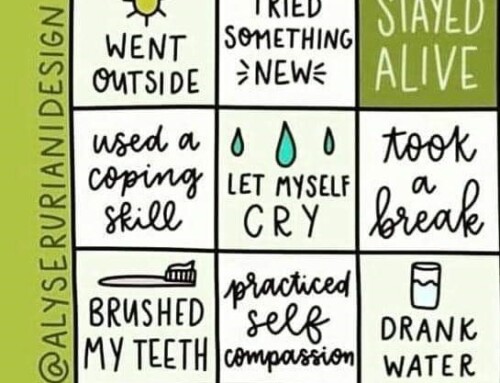If it feels as though someone or something, put your life into a giant bag, shook it up, and then dumped out the contents in an unrecognizable heap, you are not alone! Each of us has seen changes to our past routines as a result of Covid-19. From some we hear, “When I had a job”, “Before I got sick”, “When the kids were in school”, or “Since I lost my partner”. Whatever your experience has been, whether working on the frontlines in healthcare, or feeling isolated alone in your home, here are some basic steps that may help to begin making sense, of re-shaping what your unique changes mean to you.
Step 1: Exercise self-compassion. You, ‘we’ have and are experiencing life in a way that is foreign to us, unprecedented, and that most do not have context for. You may feel a bit beat up by the world. Please know, that you do not need to have all the answers right now! Surround yourself with a support system. Those who empathize and validate your experience. Engage in soothing and self-care activities. Speak as kindly to yourself as you would a friend or loved one whose life has been thrown into chaos.
Step 2: Acknowledge grief. If you have lost loved ones, it is important that you take time with this, and speak with a professional. Loss is a life adjustment, not an event to “get over”. Allowing time and emotional space to ‘sit with’ the many emotions that are rolled up in grief is key. Avoid moving too quickly through the process of mourning, and memorializing those you have lost. We are finding the need to find new ways and think differently about memorial services, even hugging others during this pandemic time. There is no timetable for moving through your losses. You are vulnerable, don’t allow others to pressure your decisions. For many individuals, the changes to their lives will bring symptoms of grief. They may have lost someone, or something; a home, a job, or joy. Many have felt the loss of an anticipated event, attending a graduation, holding a new grandchild, sitting in a worship service.
Step 3: Prioritize self-care: Managing stresses, relationships, and day to day responsibilities is best approached when we are thinking with clarity. There is no substitute for good sleep, healthy eating, time in the sunshine, and moderate exercise! If we are lacking in these basics, our judgement may be skewed, or we may be more easily irritated, and reactionary. Take care to evaluate if your self-care activities are healthy for you. Avoid too much alcohol, food, or time sitting. Make a list of things that have helped you in the past, things that help when typical stresses show up, engage in those and consider new ways of soothing self.
Step 4: Maintain consistency: Where possible, resist or postpone making other changes. By its nature, change elicits other change, and some are not necessary or welcomed. Large decisions such as switching schools, separation or divorce, job changes, or relocation, if not immediately necessary may be better served may waiting for a sense of normalcy to return. When we try to “fix” too quickly, sometimes the solution is only temporary and can result in unexpected consequences we may not be in a position to handle. It is important to find areas that can remain consistent, keeping parts of our routine, continuing a weekly get-together with friends, if only virtually. Or, staying on track in small ways with a goal or hobby. All things do not need to be put on hold when some things change. It is important to take small steps and evaluate along the way.
Step 5: Allow for differences: Your experience of coping or thriving during pandemic times will be different that others you know. Being open to another’s experience can help diffuse potential conflict. For example, where one person values their down time, another may increase their need to chat. Allowing for these and having meaningful conversations around these are an opportunity to find a compromise. If you and your partner disagree on what it means to begin to “open back up” and go out into society more, take time to take in their perspective. Exercise curiosity over judgement. For couples, it may be a great time to look at how you, as a couple, conflict or make decisions. You may want to contact a couple’s therapist who provides virtual therapy sessions, to help you work through this.
Step 6: Slow Down, take time: It is important to take time in finding what works for you moving forward. To think we have to to “get back to normal” can fuel feelings of anxiety or depression. Pressure to have things “wrapped up and tied up with a neat bow” can also put pressure on you and your relationships as a result of developing unrealistic expectations. Where there is no clear timetable, trying to apply one, can be detrimental. Slowing down helps us to take a look at how we have seen situations in the past, and if our approach is applicable now. Taking time allows us to consider and ‘try on’ another’s perspective.
Step 7: Acknowledge your strengths: Do not ignore the ways you have managed well, spend more time focusing on your strength and resilience than letting your mind play and replay the downsides of this experience. Self-affirmation is powerful! “I’ve got this”. “I am capable”, “I am strong”. Can it be, that the pandemic of 2020 has also served as a reminder of how capable you are? Has it cleared some of the mundane part of life, leading us to a greater self-appreciation?
Step 8: Take the wheel: Consider your areas of control; those responsibilities, or others who may be within your realm of influence. Let go of the rest! When we are focused on steps that will bring us successes and feelings of accomplishment and “the win”, we can celebrate those achievements and move forward in greater confidence. Letting go of those things not within our control can be a great relief. It may be helpful to support and love on another through tough time, but beware of taking on more of others emotions, and responsibilities during this time.
Step 9: Be ‘in the process’. Reflect on your ability to be flexible as an individual. Are you able to be flexible and consider other points of view, in your relationship, in your family, with your employer? Ask yourself “What have I learned from this experience this far? What have a learned from others”, “How can I come out on the other side of this, stronger, more compassionate, and with a greater appreciation?” “Have I learned what parts of this experience I want to continue as a part of my life moving forward?” When experiencing personal setbacks, to recognize those and allow self care at that time is important.
Step 10: Consider alternatives to ‘Normal’. Perhaps we may NOT want things to return to ‘Normal’. By exercising self-compassion, working within our areas of control, prioritizing self and our relationships, we may see increased abilities to allow ourselves to live the ways we have dreamed or spoken of before. To- “Spend more time with those I love”, “Get in touch with who I am”, or “Live an authentic life”. Perhaps the ‘new non-normal’ is understanding how to manage our ‘Now’, being mindful, connecting in the moment, and understanding that through continued flexibility, preparation, and being process focused, we may better meet unwanted ‘invisible enemies’ or other challenges of our human experience.
Afterall, we are ‘all in this together’-Differently.





